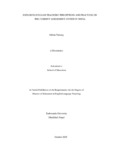
Please use this identifier to cite or link to this item:
https://hdl.handle.net/20.500.14301/553Full metadata record
| DC Field | Value | Language |
|---|---|---|
| dc.contributor.author | Tamang, Sabina | - |
| dc.date.accessioned | 2025-11-11T11:24:50Z | - |
| dc.date.available | 2025-11-11T11:24:50Z | - |
| dc.date.issued | 2025-10 | - |
| dc.identifier.citation | Tamang,S.(2025).Exploring English teachers’ perceptions and practices on the current assessment system in Nepal. | en_US |
| dc.identifier.uri | https://hdl.handle.net/20.500.14301/553 | - |
| dc.description.abstract | An assessment is an inevitable component of teaching learning process. It should not be considered only as a tool to measure the achievement of the students’ learning outcomes. Instead of taking it as a separate entity, it should be aligned with teaching learning activities to achieve the intended learning objectives. However, in the context of Nepal, the examination system guides the teaching learning process. Instead of incorporating both formative and summative assessments, summative assessment works dominantly in the process of assessing students’ knowledge, language competence, and skills. This study explored the Nepali English language teachers’ perceptions and experiences in assessment practices. This study followed interpretive research paradigm and adopted narrative inquiry as a research method. I purposively selected four secondary-level English language teachers teaching in private and public schools of Taplejung district as participants in which one was female and others were males. The participants had more than 10 years of teaching experiences. I took several rounds of in-depth interviews to understand their assessment practices. After that, I transcribed and translated the collected information and formed the codes out of that information. I generated the themes by categorizing the codes. Moreover, Gardner’s multiple intelligence theory guides this study. The findings revealed that English language teachers take assessment as both a ritual and a burden. They carried out the assessment in a traditional way (i.e. assessment of learning). They used tests, terminal, and final examinations as the main tool of assessing students’ knowledge and skills. Furthermore, English language teachers do not give equal emphasis to all language skills during teaching and assessment. They prioritize reading and writing skills which is from examination perspective. It shows that assessment of learning still dominates over assessment for learning and assessment as learning. This study implies that there is the essence of trainings for teachers to carry out the assessment effectively in their classroom. The curriculum designers and policymakers have to take this issue seriously and work on the school-level assessment system. The strict supervision should be done in every school regarding the effective implementation of both formative and summative assessment. The teachers have to be taught the ways of integrating assessment in teaching learning process to enhance the students’ learning. | en_US |
| dc.language.iso | en | en_US |
| dc.publisher | Kathmandu University School of Education | en_US |
| dc.title | Exploring English Teachers’ Perceptions and Practices on the Current Assessment System in Nepal | en_US |
| dc.type | Dissertation | en_US |
| local.school.name | SOED | en_US |
| local.school.department | DOLE | en_US |
| local.school.program | Master of Education in ELT (2 years) | en_US |
| local.school.level | Masters | en_US |
| Appears in Collections: | Research Report | |
Files in This Item:
| File | Description | Size | Format | |
|---|---|---|---|---|
| Sabina Tamang_Master's Final Dissertation.pdf | 1.24 MB | Adobe PDF |  View/Open |
Items in DSpace are protected by copyright, with all rights reserved, unless otherwise indicated.